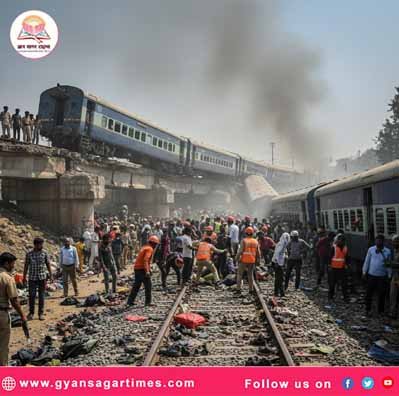
क्यूँ मर जाती है संवेदनाएं…?
भारतीय रेल नेटवर्क दुनिया के सबसे बड़े रेल नेटवर्कों में से एक है और यह नेटवर्क देश की जीवन रेखा है. यह करोड़ों लोगों की यात्रा को सुगम बनाती है और अर्थव्यवस्था की रीढ़ बनी रहती है.परंतु जब बात विशेष प्रयोजन की आती है तो तब रेलवे की संवेदनशीलता अक्सर लुप्त होती प्रतीत होती है जैसे कि – त्यौहारों पर भीड़ का अनियंत्रित होना, दुर्घटनाएँ, प्राकृतिक आपदाएँ,आपदा राहत, शवों की ढुलाई, या सामाजिक आंदोलनों से जुड़ी यात्राएं.
रेलवे की संवेदनहीनता के पीछे कई कारण हो सकते हैं जैसे कि, व्यवस्थागत कारण या यूँ कहें कि, संरचनात्मक और परिचालन संबंधी. रेलवे एक विशाल, बहुस्तरीय संगठन है और इसके संचालन में कठोर नियम और प्रक्रियाएं हैं, जो मानवीय परिस्थितियों को प्राथमिकता नहीं देतीं. विशेष परिस्थितियों में निर्णय लेने की क्षमता रखने वाले अधिकारी अक्सर संवेदनशीलता से नहीं, बल्कि औपचारिकता से काम लेते हैं और संकट के समय, निर्णय लेने की प्रक्रिया धीमी हो जाती है. उच्च स्तर पर लिए गए निर्णय ज़मीनी स्तर तक पहुँचने और लागू होने में समय लेते हैं.
सबसे बड़ी बात तो यह है कि, दायित्व का अस्पष्ट विभाजन होने से कोई भी अधिकारी तत्काल और निर्णायक कार्रवाई करने से हिचकिचाता है, क्योंकि यह “उसके अधिकार क्षेत्र” में नहीं आता है. दूसरी तरफ, भारतीय रेलवे पहले से ही उच्चतम उपयोगिता पर चल रही है. अक्सर, त्यौहारों या विशेष आयोजनों पर जब भीड़ अप्रत्याशित रूप से बढ़ती है, तो बुनियादी ढाँचा (प्लेटफॉर्म, टिकट काउंटर, ट्रेनें) चरमरा जाता है. अतिरिक्त भीड़ को संभालने के लिए कर्मचारियों की कमी और प्रशिक्षण का अभाव होता है, जिससे यात्रियों को असुविधा होती है, जिसे अक्सर संवेदनहीनता के रूप में देखा जाता है.वहीँ, फाइलों में अटकी सहमति, विभागीय टालमटोल और जवाबदेही की कमी संवेदनशील निर्णयों को बाधित करती है.
रेलवे के फ्रंटलाइन स्टाफ (जैसे टीटीई, गार्ड, आरपीएफ) को भीड़ प्रबंधन और संकटकालीन मनोविज्ञान में पर्याप्त संवेदनशील प्रशिक्षण नहीं मिलता साथ ही लगातार काम के उच्च दबाव और तनाव के कारण भी कर्मचारियों में मानवीय प्रतिक्रिया कम हो सकती है.
रेलवे को केवल एक तंत्र नहीं, बल्कि एक सामाजिक संस्था के रूप में देखना चाहिए, जो मानवीय मूल्यों को प्राथमिकता दे. विशेष प्रयोजन अक्सर सामाजिक न्याय से जुड़े होते हैं जैसे कि, किसानों की यात्रा, शहीदों के पार्थिव शरीर की वापसी, ऐसे मामलों में रेलवे की संवेदनशीलता उसकी नैतिक जिम्मेदारी है. वहीँ, आम नागरिक रेलवे से न केवल सेवा, बल्कि सहानुभूति की भी अपेक्षा करता है। जब यह अपेक्षा टूटती है, तो विश्वास भी टूटता है.
संवेदना को वापस लाने के लिए संरचनात्मक और सांस्कृतिक दोनों स्तरों पर सुधार आवश्यक हैं जैसे कि –
- संकट के समय तेज़ और केंद्रीकृत निर्णय लेने के लिए स्पष्ट प्रोटोकॉल और ज़िम्मेदार अधिकारियों का तत्काल निर्धारण.
- कर्मचारियों के लिए सहानुभूति, संकट प्रबंधन और भीड़ नियंत्रण पर नियमित और प्रभावी प्रशिक्षण सत्र आयोजित करना.
- वास्तविक समय की भीड़ सूचना और यात्री संचार को बेहतर बनाने के लिए डिजिटल साधनों का प्रभावी उपयोग करना.
- महत्वपूर्ण मार्गों और त्यौहारों के समय अतिरिक्त ट्रेनों और बुनियादी ढाँचे में निवेश करना.
- भीड़ के समय नॉन स्टॉपेज ट्रेन का परिचालन करते भीड़ से दूर के ट्रैक का उपयोग करना.
रेलवे की संवेदनहीनता उसकी इच्छाशक्ति की कमी से ज़्यादा, जटिल संगठनात्मक संरचना, संसाधनों की कमी और असाधारण दबाव का परिणाम है. रेलवे को अपनी “जीवन रेखा” की छवि बनाए रखने के लिए वह लोहे की पटरियों पर चलने वाली मशीन नहीं, बल्कि जनता की भावनाओं को समझने वाली संस्था बने तभी, उसकी संवेदना जीवित रह पाएगी…
========== ========= ===========
Why do emotions die?

The Indian Railways network is one of the largest rail networks in the world and is the lifeline of the country. It facilitates the travel of millions of people and remains the backbone of the economy. However, when it comes to special circumstances, the railway’s sensitivity often seems to vanish, such as during uncontrolled crowds at festivals, accidents, natural disasters, disaster relief, transportation of bodies, or travel related to social movements.
There can be several reasons behind the railway’s insensitivity, such as systemic reasons, or rather, structural and operational ones. The railway is a vast, multi-layered organization with rigid rules and procedures in its operation, which do not prioritize human circumstances. Officials with the authority to make decisions in special situations often act formally rather than with sensitivity, and during times of crisis, the decision-making process slows down. Decisions made at higher levels take time to reach and be implemented at the ground level.
Most importantly, the unclear division of responsibility leads to hesitation on the part of any official to take immediate and decisive action, as it does not fall under “their jurisdiction.” On the other hand, Indian Railways is already operating at peak capacity. Often, during festivals or special events when crowds increase unexpectedly, the infrastructure (platforms, ticket counters, trains) becomes overwhelmed. There is a shortage of staff and a lack of training to handle the extra crowds, causing inconvenience to passengers, which is often perceived as insensitivity. Similarly, delays in approvals, departmental procrastination, and a lack of accountability hinder sensitive decision-making.
The railway’s frontline staff (such as TTEs, guards, RPF) do not receive adequate sensitivity training in crowd management and crisis psychology, and the constant high pressure and stress of work can also reduce humane responses among employees. Railways should be viewed not merely as a system, but as a social institution that prioritizes human values. Special purposes are often linked to social justice, such as facilitating farmers’ travel or the repatriation of martyrs’ remains; in such cases, the railway’s sensitivity is its moral responsibility. Similarly, the average citizen expects not only service but also empathy from the railways. When this expectation is broken, trust is also broken.
To restore empathy, reforms are needed at both structural and cultural levels, such as:
- Immediate establishment of clear protocols and designated officers for swift and centralized decision-making during times of crisis.
- Conducting regular and effective training sessions for employees on empathy, crisis management, and crowd control.
- Effective utilization of digital tools to improve real-time crowd information and passenger communication.
- Investing in additional trains and infrastructure on crucial routes and during festivals.
- Operating non-stop trains on tracks away from crowded areas during peak times.
The railway’s insensitivity is less a result of a lack of willpower and more a consequence of its complex organizational structure, resource constraints, and extraordinary pressures. For the railways to maintain its image as a “lifeline,” it must become an institution that understands the emotions of the public, rather than merely a machine running on iron tracks. Only then will its empathy remain alive…





